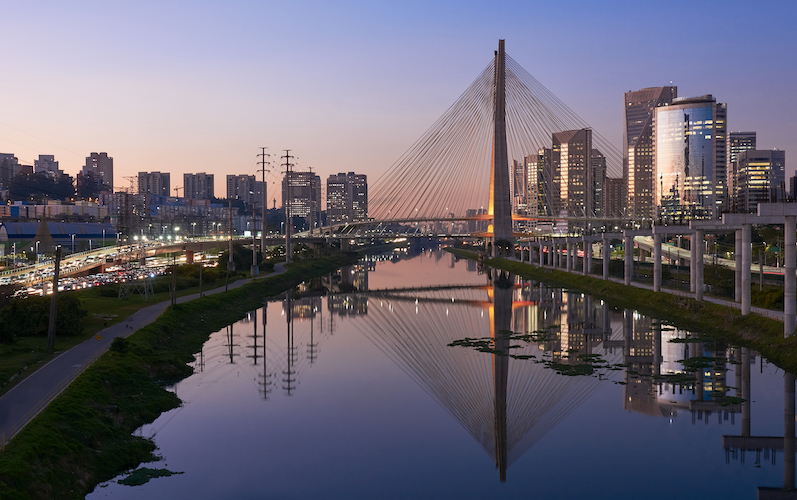
In Brazil, a political crisis rages between federal and state governments as coronavirus cases keep rising.
Brazil has the second highest number of confirmed COVID-19 cases in the world. The first case was identified on February 25 in São Paulo, and since then, the federal government has tried to enforce new measures in all 26 states and the Federal District through federal regulation, including travel restrictions, taxes, mass layoffs, credit facilities, opening restrictions, social distancing, and financial aid.
The Bolsonaro Administration, however, is sending mixed signals about the severity of the outbreak in Brazil and turning a pandemic into a political debate. This posture has provoked negative responses by the media, the population, and the international community, which has led to some resistance by state governments to comply fully with federal guidelines.
In the early 20th century, Brazilian public figures, such as Oswaldo Cruz and Carlos Chagas, became a reference in the treatment of several outbreaks, such as malaria, yellow fever, smallpox, and—not coincidentally—Chagas disease. Brazil was also a “trailblazer in the HIV response,” according to the World Health Organization (WHO). Furthermore, Brazil was one of the first countries outside the Organization for Economic Cooperation and Development (OECD) to implement the constitutional right to universal health coverage through Sistema Único de Saúde—the country’s Unified Health System. Brazil’s National Immunization Program is known worldwide, and Brazil recently led research on the Zika virus.
Yet Brazil has one of the worst responses to COVID-19 among all affected countries, and it is heading toward becoming the new epicenter of the pandemic. What went wrong?
Brazil now faces three different crises due to a lack of regulatory excellence: a health crisis, an economic crisis, and a political crisis. The health and economic crises were to be expected once the outbreak of the novel coronavirus began to spread throughout the world. But the political crisis in Brazil is completely homegrown.
Despite concern about the impact of the outbreak on Brazilians, particularly those living in poor communities, the response of the federal government has been plagued by disputes inside the Bolsonaro Administration. Fueled by the strong denialist rhetoric of President Jair Bolsonaro—who has referred to COVID-19 as a “little flu” and refused to comply with WHO guidelines—the Administration’s internal disputes have delayed implementation of coherent federal regulatory measures in the health system and increased the ongoing political instability.
In contrast, the Ministry of Health, at that time led by Luiz Henrique Mandetta, advocated a strict social distancing framework recommended by the WHO. But following his ally President Donald J. Trump, President Bolsonaro failed to take seriously the need to mitigate the potential impacts of the pandemic, ignoring scientific findings that were against his beliefs and showing more concern about an economic recession than the spread of the virus. The dispute inside the federal government led to Bolsonaro’s dismissal of Mandetta and, less than a month later, the resignation of Mandetta’s successor as Health Minister, Nelson Teich.
Adding to the political turmoil, Sérgio Moro—the former judge who oversaw several cases in the so-called Lava Jato, or Car Wash, investigation—resigned his position as justice minister due to an alleged interference by President Bolsonaro in matters under the authority of the federal police and the regional head of police in Rio de Janeiro. The allegations have significantly increased political instability and ignited ongoing impeachment discussions.
Resisting the minimal COVID-19 guidelines propagated by the Bolsonaro Administration, the state governors decided not to comply with federal regulations and guidelines. As a result, public health measures became regionalized, with an ongoing dispute for needed health care resources taking place across the country. Although governors and mayors became essential leaders in the fight to contain the impact of the pandemic, the lack of federal regulation has jeopardized the effective monitoring and control of the population to contain the spread of the virus.
Federal prosecutors have launched an investigation into the Rio de Janeiro state governor because of “irregularities in contracts awarded for the construction of emergency field hospitals.” Other federal investigations related to states’ pandemic responses have emerged across the country.
The regulatory measures implemented by the federal government were generally related to addressing economic impacts, implementing travel and border restrictions, providing financial support for businesses and and some social aid programs. and increasing liquidity through the Central Bank of Brazil. The government has recognized that the calamity in Brazil will affect compliance with the fiscal primary balance target for the year.
The media have criticized several federal policies. For instance, federal tax measures have been interpreted as an opportunity identified by the government to anticipate changes that were already in sight with the tax reform. The amendment of labor laws has been seen by some commentators as a violation of socioeconomic rights.
The federal government has also been the target of critics regarding transparency of the number of confirmed COVID-19 cases and deaths. After the federal government was accused of delaying daily reports, and even ceasing to report the cumulative COVID-19 numbers on the Ministry of Health website, the Brazilian Supreme Court interfered, determining that the government must resume full disclosure of COVID-19 cumulative data.
Perhaps because of the internal instability caused by authoritarian-inspired leadership and a strong sense of moral indifference against the social and moral costs of the pandemic—or perhaps due to the restrictions that President Bolsonaro has imposed on ministers—the Brazilian Ministry of Health is not acting as a protagonist in the fight against COVID-19. Following ongoing discussions on chloroquine, for example, health officials became much more focused on the treatment of COVID-19 instead of the prevention of the spread of the virus.
The Ministry of Health should have implemented a system of contact tracing and selective isolation, as was done in Vietnam. In the United States, Massachusetts is using a network of public health workers to contain the spread of the virus. Brazil has a similar program in which community health agents can follow up with local health conditions and monitor diseases and risk areas in communities. But the Ministry of Health has yet to use the program so it could play a key role in containing the spread of the coronavirus.
Analyzing Brazilian demographics is also essential to understand the high transmission rate of the coronavirus. Although Brazil has infrastructure for interstate and international travel, several regions have yet to reach a sufficient stage of development to implement preventive measures, much less to maintain the social distancing of the population. For instance, almost 35 million people in Brazil have no access to clean water, so they are barely able to comply with the primary recommendations to wash hands and to stay at home. The social inequalities among communities make complying with the “stay-at-home” orders impractical for disadvantaged populations.
The country’s COVID-19 case numbers reflect this inequality in Brazil, considering that a significant part of the population cannot stay isolated at home and protect themselves against the virus. In addition, COVID-19 infections are now spreading at a faster pace in countryside cities that have less infrastructure and resources, while the capitals are gradually reopening the economy.
The federal government has implemented a regulatory framework for social assistance to provide financial aid to some retired elderly, unemployed, and underprivileged people who are registered in the social protection program, Cadastro Único Federal. Despite this program, many Brazilians lack important resources. For example, almost one million people have no access to electricity in the Amazon region, and about 46 million people in Brazil had no internet access in 2018. With such limitations, these people face additional struggles to register for the social protection program to receive government assistance.
Another problematic factor is that many of those Brazilians who do have the financial means to comply with social distancing measures are instead taking their example from the President and ignoring all public health recommendations. As the pandemic has spread throughout Brazil, a significant proportion of Bolsonaro’s supporters have joined in protests against the state governors and the Federal Supreme Court—the latter for opposing President Bolsonaro and reassuring the power of states and municipalities in Brazilian federalism. These protests have been supported by part of the nation’s population due to misleading information spread by high levels of the federal government, which have ended up jeopardizing local efforts to contain the pandemic based on scientific data and WHO guidelines.
Although President Bolsonaro appointed a former military officer to serve as the Health Minister for an interim period, that position remains unfilled with a permanent Minister, even as deaths and confirmed cases continue to increase exponentially.
Even more tragically, the adverse effects of the lax regulatory framework imposed by the Bolsonaro Administration are not limited to the Brazilian borders. When governments disregard reasonable or appropriate public health measures, the moral vacuum only further increases marginalization, extreme poverty, and violence in the entire region. International bodies should take a closer look at what is happening—or, all too often, what is not happening—in Brazil that has led it to become one of the global pandemic’s top victims.
This essay is part of an ongoing series, entitled Comparing Nations’ Responses to COVID-19.





